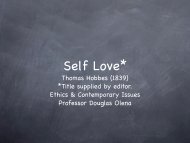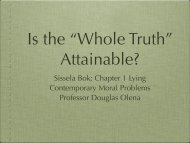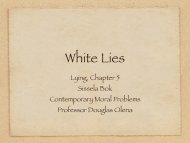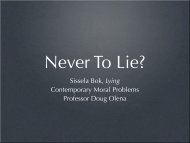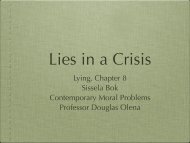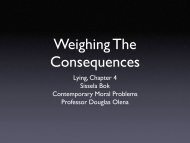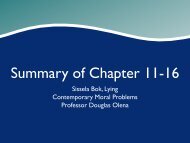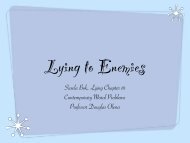Truthfulness, Deceit, and Trust - Olena's
Truthfulness, Deceit, and Trust - Olena's
Truthfulness, Deceit, and Trust - Olena's
You also want an ePaper? Increase the reach of your titles
YUMPU automatically turns print PDFs into web optimized ePapers that Google loves.
<strong>Truthfulness</strong>, <strong>Deceit</strong>,<br />
<strong>and</strong> <strong>Trust</strong><br />
Sissela Bok; Chapter 2 Lying<br />
Contemporary Moral Problems<br />
Professor Douglas Olena
Outline<br />
Lying <strong>and</strong> Choice<br />
The Perspective of the Deceived<br />
The Perspective of the Liar<br />
Discrepant Perspectives<br />
The Principle of Veracity
Lying <strong>and</strong> Choice<br />
18 “<strong>Deceit</strong> <strong>and</strong> violence—these are the two forms of<br />
deliberate assault on human beings. Both can coerce<br />
people into acting against their will.”<br />
“<strong>Deceit</strong> controls more subtly, for it works on belief as<br />
well as action.”<br />
Deception can be used for self defense as well as<br />
survival.
Lying <strong>and</strong> Choice<br />
18 Imagine a society where there were no dependable<br />
truth.<br />
“There must be a minimal degree of trust in<br />
communication for language <strong>and</strong> action to be more<br />
than stabs in the dark.”<br />
19 “A society, then, whose members were unable to<br />
distinguish truthful messages from deceptive ones,<br />
would collapse.”
Lying <strong>and</strong> Choice<br />
19 What happens when lies are perpetrated?<br />
“A lie, in Hartmann’s words, ‘injures the deceived<br />
person in his life; it leads him astray.’”<br />
“To the extent that knowledge gives power, to that extent<br />
do lies affect the distribution of power; they add to that<br />
of the liar, <strong>and</strong> diminish that of the deceived, altering<br />
his choices at different levels.”<br />
“Lies may also eliminate or obscure relevant<br />
alternatives.”
Lying <strong>and</strong> Choice<br />
19 “Lies foster the belief that there are more alternatives<br />
than is really the case; at other times, a lie may lead to<br />
the unnecessary loss of confidence in the best<br />
alternative.”<br />
19, 20 “The degree of uncertainty in how we look at our<br />
choices can be manipulated through deception.”<br />
20 Why is there such a difference of opinion about the<br />
effects of deception between the liar <strong>and</strong> the deceived?
Perspective of the Deceived<br />
20 “Those who have learned they have been lied to in an<br />
important matter… are resentful, disappointed, <strong>and</strong><br />
suspicious.”<br />
It is the loss of choice in the matter that grates most<br />
against us.<br />
21 We may wish to be lied to but prefer to choose when<br />
that would happen.
Perspective of the Deceived<br />
21 Such alternatives should be chosen <strong>and</strong> not<br />
“imposed by lies or other forms of manipulation.”<br />
21 “The perspective of the deceived is shared by all those<br />
who feel the consequences of a lie, whether or not they<br />
are themselves lied to.” (bombing in Cambodia)
Perspective of the Deceived<br />
21, 22 “Just as skepticism denies the possibility of<br />
knowledge, so determinism denies the possibility of<br />
freedom. Yet both knowledge <strong>and</strong> freedom to act on it<br />
are required for reasonable choice.”<br />
22 To say that lying makes no difference in the overall<br />
“misinformation or ‘unfreedom’ of those lied to,” is a<br />
perspective that the deceived cannot share.<br />
Deception can be coercive. “When it succeeds , it can<br />
give power to the deceiver.”
Perspective of the Deceived<br />
22 “From this perspective, it is clearly unreasonable to<br />
assert that people should be able to lie with impunity<br />
whenever they want to do so.”<br />
“In refusing to condone such a right to decide when to<br />
lie <strong>and</strong> when not to, we are therefore trying to protect<br />
ourselves against lies which help to execute or cover up<br />
all other wrongful acts.
Perspective of the Deceived<br />
From this position, Aristotle has said, “Falsehood is in<br />
itself mean <strong>and</strong> culpable, <strong>and</strong> truth noble <strong>and</strong> full of<br />
praise.”<br />
22 “There is an initial imbalance in the evaluation of<br />
truth telling <strong>and</strong> lying. Lying requires a reason, while<br />
truth telling does not.”<br />
Lying “must be excused; reasons must be produced, in<br />
any one case, to show why a particular lie is not ‘mean<br />
<strong>and</strong> culpable.’”
Perspective of the Liar<br />
23 Liars believe “that they can make wise use of the<br />
power that lies bring. And they may have confidence in<br />
their ability to distinguish the times when good reasons<br />
support their decision to lie.”<br />
“Liars share with those they deceive the desire not to be<br />
deceived.”<br />
“They would prefer… a ‘free-rider’ status, giving them<br />
the benefits of lying without the risks of being lied to.”
Perspective of the Liar<br />
23 “The free rider trades upon being an exception, <strong>and</strong><br />
could not exist in a world where everybody chose to<br />
exercise the same prerogatives.”<br />
“It is crucial to see the distinction between the<br />
freeloading liar <strong>and</strong> the liar whose deception is a<br />
strategy for survival in a corrupt society.”<br />
24 “Dupes tend to be less sanguine about the good<br />
intentions of those who deceive them.”
Perspective of the Liar<br />
24 The outlook of the liar tends to ignore harm to<br />
themselves <strong>and</strong> harm to society.<br />
A liar breaks his integrity. Credibility <strong>and</strong> respect for<br />
his word are damaged.<br />
“A public lie on an important matter, once revealed,<br />
hurts the speaker, must we conclude that every lie has<br />
this effect?<br />
Do white lies hurt the liar in the same way?
Perspective of the Liar<br />
25 White lies probably do not harm the liar in the same<br />
way as a public lie about an important matter, “But the<br />
problem for liars is that they tend to see most of their<br />
lies in this benevolent light <strong>and</strong> thus vastly<br />
underestimate the risks they run.”<br />
Liars have to cover up their lies with other lies. “The sheer<br />
energy the liar has to devote to shoring them up is<br />
energy that honest people can dispose of freely.”
Perspective of the Liar<br />
26 “Even if the liar cares little about the risks to others<br />
from his deception, therefore, all these risks to himself<br />
argue in favor of at least weighing any decision to lie<br />
quite seriously.”<br />
Liars also underestimate the harm done to individuals<br />
lied to <strong>and</strong> to society in general.
Perspective of the Liar<br />
26, 27 “<strong>Trust</strong> is a social good to be protected just as<br />
much as the air we breathe or the water we drink. When<br />
it is damaged, the community as a whole suffers; <strong>and</strong><br />
when it is destroyed, societies falter <strong>and</strong> collapse.”<br />
27 “We live at a time when the harm done to trust can<br />
be seen first-h<strong>and</strong>. Confidence in public officials <strong>and</strong><br />
in professionals has been seriously eroded.”
Perspective of the Liar<br />
27, 28 “It is the fear of the harm lies bring that<br />
explains statements such as the following from<br />
Revelations (22:15), which might otherwise seem<br />
strangely out of proportion:<br />
These others must stay outside [the Heavenly City]:<br />
dogs, medicine-men, <strong>and</strong> fornicators, <strong>and</strong><br />
murderers, <strong>and</strong> idolaters, <strong>and</strong> everyone of false life<br />
<strong>and</strong> false speech.
Discrepant Perspectives<br />
28 We need to see both perspectives at once. Applying<br />
the Golden Rule is to be able to “experience one’s acts not<br />
only as subject <strong>and</strong> agent but as recipient, sometimes<br />
victim.”<br />
“We can all readily share both perspectives.”
Discrepant Perspectives<br />
29 “The parallel between deception <strong>and</strong> violence as seen<br />
from these two perspectives is, once again, striking. For<br />
both violence <strong>and</strong> deception are means not only to<br />
unjust coercion, but also to self-defense <strong>and</strong> survival.”<br />
“The hero uses deceit to survive.” David of Israel feigned<br />
madness to avoid worrying the king of the Philistines.
Principle of Veracity<br />
30 “The perspective of the deceived, then, reveals several<br />
reasons why lies are undesirable.”<br />
“For these reasons, I believe that we must at the very<br />
least accept as an initial premise Aristotle’s vies that<br />
lying is ‘mean <strong>and</strong> culpable’ <strong>and</strong> that truthful<br />
statements are preferable to lies in the absence of special<br />
considerations.”<br />
“This premise gives an initial negative weight to lies.
Principle of Veracity<br />
30 The principle of veracity will be used in the<br />
following chapters “as an expression of this initial<br />
imbalance in our weighing of truthfulness <strong>and</strong> lying.”<br />
31 “Mild as this initial stipulation sounds, it would, if<br />
taken seriously, eliminate a great many lies told out of<br />
carelessness or habit or unexamined good intentions.”



